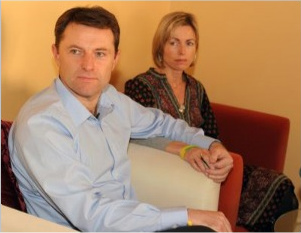 |
|
Gerry and Kate McCann's spokesman Clarence
Mitchell described the revelations “as a completely
historical note”. Photo: CHRIS GRAEME, THE RESIDENT GROUP |
The British Ambassador to Portugal confided with the United
States Ambassador that British police suspected
Kate and
Gerry McCann over the disappearance of their daughter
Madeleine in 2007.
In the latest explosive WikiLeaks revelation, the Spanish daily
newspaper El Pais published news on Tuesday that in a telegram dated
September 28, 2007, US Ambassador Alfred Hoffman revealed details of a
short conversation he had had with Alexander Ellis, the newly-appointed
British Ambassador to Lisbon.
“Ellis didn’t go into details about the case, but admitted that it was
the British police themselves who found proof” which led them to suspect
the McCann couple.
The United States ambassador also revealed that his British opposite
number had told him that the Portuguese and British police “were working
cooperatively” on the investigations.
Two weeks earlier Portuguese police had named Gerry and Kate McCann as
‘arguidos’ or formal
suspects.
The McCann’s spokesman,
Clarence Mitchell,
immediately
downplayed the information which appeared on the Portuguese and Spanish
news on Monday “as a completely historical note”.
Portuguese evening news coverage on Monday included commentaries from
the former police detective who led the case into the disappearance of
Madeleine,
Goncalo Amaral.
But Goncalo Amaral, the author of the explosive and banned book Maddie –
The
Truth
of the Lie (Maddie -
A Verdade de Mentira) said on Monday
night that it was “strange” that it had been necessary for an ambassador
to talk about evidence in order to give “some veracity to the McCanns’
alleged involvement”.
“I led the investigation, I know what’s there and what needs to be done
and I know that someone is responsible for Madeleine’s disappearance.
I’ve no doubt about this.
“It was not the British police who reached these conclusions. I don’t
know what evidence the British Ambassador was referring to. Now, that
there were strong indications that the parents were responsible – there
were, and that they were collected by the Portuguese police in
cooperation with the British police, they were.”
The former inspector told the press that the leaked information could
lead to the re-opening of the Madeleine case.
The cable to Washington, marked ‘confidential’ from Alfred Hoffman
Junior, stated: “without delving into the details of the case, Ellis
admitted that the British police had developed the current evidence
against the McCann parents” and added “the British and Portuguese police
have been working cooperatively”.
But the cable does not specify what evidence the British police are
alleged to have gathered or even if the UK investigators were involved
in the decision to formally name them as suspects.
In another cable, Hoffman stated: “Madeleine McCann’s disappearance in
the south of Portugal in May 2007 has generated a lot of international
media attention with controversy surrounding the Portuguese-led police
investigation and the actions of Madeleine’s parents”.
He said that the British Ambassador thought that the “media frenzy was
to be expected and was acceptable as long as government officials kept
their comments behind closed doors”.
A spokesman from the British Embassy told the Algarve Resident on
Tuesday: “We condemn any unauthorised release of classified information,
just as we condemn leaks of classified material in the UK. They can
damage national security, are not in the national interest and may put
lives at risk. We have a very strong relationship with the US
Government. That will continue.”
According to El Pais, the conversation between the two diplomats took
place in Lisbon 19 days after Gerry and Kate McCann had left Portugal
after being questioned at Polícia Judiciária headquarters in Portimao.
In that interrogation, on September 6, Madeleine’s parents were quizzed
as suspects into the accidental death of their daughter and of then
having “hidden” Madeleine’s body.
The case was later shelved because of lack of evidence on July 21, 2008
and the ‘arguido’ status on the McCanns was dropped.
One of the clearest examples of Portuguese-British police cooperation
was that all of the analyses on
material collected from the Praia da
Luz
apartment and the rental
vehicles
used by the McCanns and their friends were carried out at a
laboratory in Birmingham and paid for by the British police.
Information widely published in the Portuguese press at the time was
that information on potential evidence was “shared between the
Portuguese and British police and discussed jointly”.
The press also reported on the apparent rivalry between the two police
forces investigating the disappearance and criticising the methods used,
rivalries and criticisms which were later downplayed when the British
police stated that relations between the two forces had been
“excellent”. |


